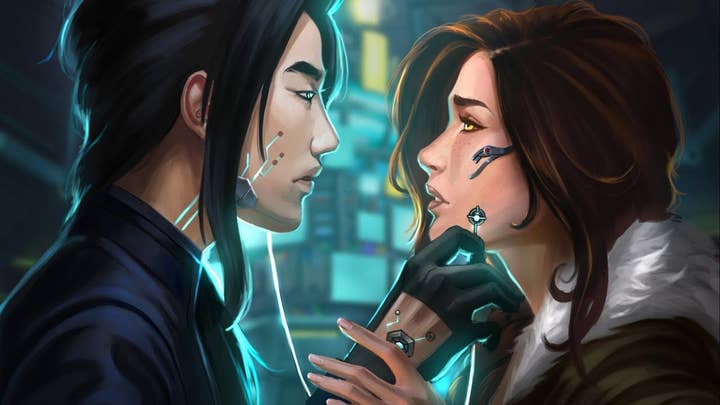Exploring the complexities of humanity through video games
Ensemble 2023: We speak to Larky Labs' Roman Alkan about her work creating narrative games, primarily for women
Sign up for the GI Daily here to get the biggest news straight to your inbox
Roman Alkan began making video games at 18. The realisation that she could make money from these projects shifted her games development from hobby to career.
Today, she stands at the head of indie games studio Larky Labs, and has been named as one of this year's Ensemble cohort – an exhibition dedicated to showcasing Black, Asian and underrepresented ethnicities working in the UK games industry.
Alkan spoke to GamesIndustry.biz during this year's Ensemble photoshoot to share more of her story, and her desire to see more complex characters explored through video games.
Alkan primarily made dressing up games aimed at girls in her early career, after which she launched Rinmaru Games, a website that allowed online play. This success encouraged her to push herself further.
"I started making [visual novels] on my website as online games, and when people really started to enjoy them, I thought that I could make it a bit more serious, make a bigger story game," she explains. "I made my first commercial game – Cardinal Cross – back in 2017, and released it on Steam. It has a very good rating, lots of good reviews. Some people really loved it, and I really enjoyed making it, and so I decided, 'Okay, I'm making interactive story games from now on, and mainly aimed at women and the female audience'."
"You can put all of your heart in artwork... but we can also entertain people. My goal as a storyteller and developer is to put these two together"
In 2020, Alkan decided to move from her home nation of Turkey to the UK, where she formed her current company Larky Labs and began work on that studio's first commercial game, Glam Pursuit. Building on her experience with Rinmaru, Larky Labs is dedicated to narrative titles, with a particular focus on stories that explore morality, and feature characters with more complex personalities.
When asked about the motivation behind this focus, Alkan says: "I don't know if this will sound too pretentious, but I think I am exploring myself and how I feel about everything, about life, about politics. Cardinal Cross is a game about politics in a sci-fi, cyberpunk world. And I wrote that when Turkey was in a politically difficult place.
"I wrote the game during the Gezi protests, and a personal difficult time of my life. I had to put that story somewhere. So I am exploring… I don't want to say the dark side of humanity, but more complex, a [greyer] area of humanity through my own experiences, my own feelings."
While there has been dramatic improvement over the past decade, and some very notable exceptions, it's safe to argue that the majority of big-budget video games still focus on delivering a power fantasy. Players triumph over great evil, accomplish incredible things, and otherwise engage in experiences that are a far cry from everyday life.
The good vs evil structure of these narratives rarely offer the opportunity to explore more complex characters, or morally grey issues, and it's rare to see the equivalent of a biopic or romance in the AAA games space. As such, it's often from the indie space that players can find a wider variety of stories – although Alkan hopes to bring elements of those power fantasies into her work at Larky Labs.
"Power fantasies are good," she says. "There's nothing wrong with that. There's a fine balance that I think we can find. You can put all of your heart in artwork, and focus on feelings, deep, complex emotions, people, personalities, and stories. Yes, we can do that, but we can also entertain people while doing and telling those kinds of stories.
"My goal personally as a storyteller and game developer is to put these two together, because I do want to make people laugh. I do want to give them a fun and light time. There is banter in my games. There are always jokes in my games. But also tell a story through another point of view."

Alkan talks of how she's keen to make main characters that aren't always the perfect, powerful, strong people you find in other areas of entertainment, but are perhaps more comparable to antagonists, with flaws and difficult personality traits. But she acknowledges that doing so is risky, as you still want players to engage with them.
"I can understand why people aren't taking the risk, because when I did that through my own story – especially when there's romance involved in games, which is a very personal aspect of a game – people don't always take it very nicely, because they don't want to add a very difficult person in their fantasies. So, there is a fine line, but I think it's okay to push the boundaries."
"It's nice to explore antagonists as a protagonist. It's really fun, because it's also a process of self-forgiveness and self-love"
As we wrap up our conversation, Alkan is keen to encourage other studios of all sizes to explore different types of characters in their games – especially antagonists.
"I think rather than ignoring certain types of people and just making them, 'Okay, this is a bad guy, these thoughts are evil,' start with that person and see how they can be pushed towards certain evil or bad actions.
"If [developers] focus on and study that in their own main characters, rather than their villains, they can write their villains and their more complex characters better. It's nice to explore antagonists as a protagonist. It's really fun, because it's also a process of self-forgiveness and self-love – because you are an imperfect person. You are an imperfect creation. So, just writing that, and seeing and trying to explore why this person is this way will help."
Sign up for the GI Daily here to get the biggest news straight to your inbox





